
Understanding what earned links are and how to effectively acquire them is pivotal for any content creator or marketer aiming for success.
Unlike buying links, which can undermine your website's credibility and potentially incur penalties from search engines, earned links stand as a testament to the quality, relevance, and value of your content.
In this blog post, we will explore the benefits of focusing on earned links over purchasing them, unveil actionable strategies to increase your collection of earned links, and answer some commonly asked questions about these types of links.
Key Takeaways
- Marketers need to produce really great content to get earned links.
- Rehashed blog posts won’t do the trick. You need to publish original content containing data, statistics, and other linkable assets to stand out.
- Earned links contribute to sustainable SEO in the long-term.
- Earned links are better for SEO and your business in general compared to buying links.
What are Earned Links?
Earned links are inbound links that a website receives purely based on the quality and relevance of its content.
These are not bought or actively sought through direct exchanges; instead, they are naturally given by other site owners, bloggers, or content creators who believe your content is valuable enough to be shared with their audience.
For instance, we published an in-depth blog article on SEO header tags giving readers useful information on how to optimize these for SEO, common mistakes to avoid, which tags to use, how to add headers to popular CMSs, etc.

Because of the value we’ve shared in the blog post, a number of high quality domains such as ColibriWP, SpyFu, and others have linked back to our resource.
Earned links serve as a powerful endorsement of your content’s authority and usefulness, significantly influencing your site's search engine ranking and visibility.
Benefits of Earned Links
When it comes to enhancing your SEO and boosting your online presence, the benefits of earned links are unparalleled.
Let's delve into how these naturally acquired endorsements can significantly impact your website’s performance:
Boosts Search Engine Rankings
Search engines like Google view earned links as votes of confidence in your content's quality and relevance. Each earned link acts as a signal to search engines that your site is a valuable resource, which can lead to higher rankings in search results.
And because we know that backlinks are one of Google’s most important ranking signals, earned links should be on the priority list of every marketer, business owner, and SEO.

Increases Website Traffic
By securing links from reputable and relevant sites, you tap into new audiences. People who click on these links are often interested in what you have to offer, leading to increased organic traffic.
Enhances Brand Authority and Credibility
Earned links come from a genuine appreciation of your content. When influential sites link to you, it signals to their audience (and the wider web) that your brand is trustworthy and authoritative in your niche.
Contributes to Sustainable SEO
Unlike bought links, which can incur link penalties if detected by search engines, earned links are completely organic. This means they contribute to a sustainable SEO strategy that stands the test of time and algorithm updates.
Facilitates Natural Network Growth
Earned links often lead to organic relationships with other content creators, opening doors to collaborations, guest posting, and other opportunities that can further elevate your brand.
Incorporating earned links into your SEO strategy isn't just beneficial; it's essential for long-term success.
Earned Links vs Buying Links: Which is Better for SEO?
Earned links are the gold standard in SEO. They are a genuine endorsement of your site's quality and relevance, leading to several key benefits as explained above.
Conversely, buying links offers immediate results but comes with significant downsides such as it actually being against Google's guidelines and policies.

Furthermore, paid links often lack relevance and can actually harm your site's authority and the financial burden of continuously purchasing links to maintain rankings can quickly accumulate.
It's safe to assume that earned links are much better for your SEO than buying links.
How to Get More Earned Links?
Now that you've got a better idea of earned links, how do you actually go about getting more of them?
It's quite obvious that getting earned links is out of your control, hence the name "earned" links.
However, there are specific things that you can do to maximize the odds of getting more earned links to your website.
1. Create Great Content
Great content forms the bedrock of earning valuable links from other websites. But what exactly makes content "great"?
At its core, great content must resonate with your audience, addressing their needs, questions, and pain points.
That's why it's essential that you have a clear understanding of the search intent behind the focus keywords you are targeting.
In an age of information overload, your message must cut through the noise. Clear, concise, and well-structured content ensures that readers grasp your key points quickly, enhancing both shareability and linkability.
You could also incorporate engaging visuals – from infographics and videos to custom illustrations – to complement and enhance your message. Visuals not only increase readability and retention but also make your content more attractive for linking and sharing.
No one likes a copycat, so don't just rehash existing information that you can find online.
2. Publish Original Research and Industry-Relevant Findings
Another way to gain earned links is by adding original research and data relevant to your industry.
Not only will this help you gain more links, but it also adds to the value of your content.
Publishing unique insights, surveys, or studies can make your content a primary source for others in your field.
- Tom Desmond, UpperCut SEO
A study by Buzzsumo and Mantis Research revealed that a whopping 94% of marketers believe that original research elevates a brand’s authority.
In addition to that, the same study also indicates that marketers have seen increased social shares, mentions from media, and backlinks from other sites as a result of publishing original research.
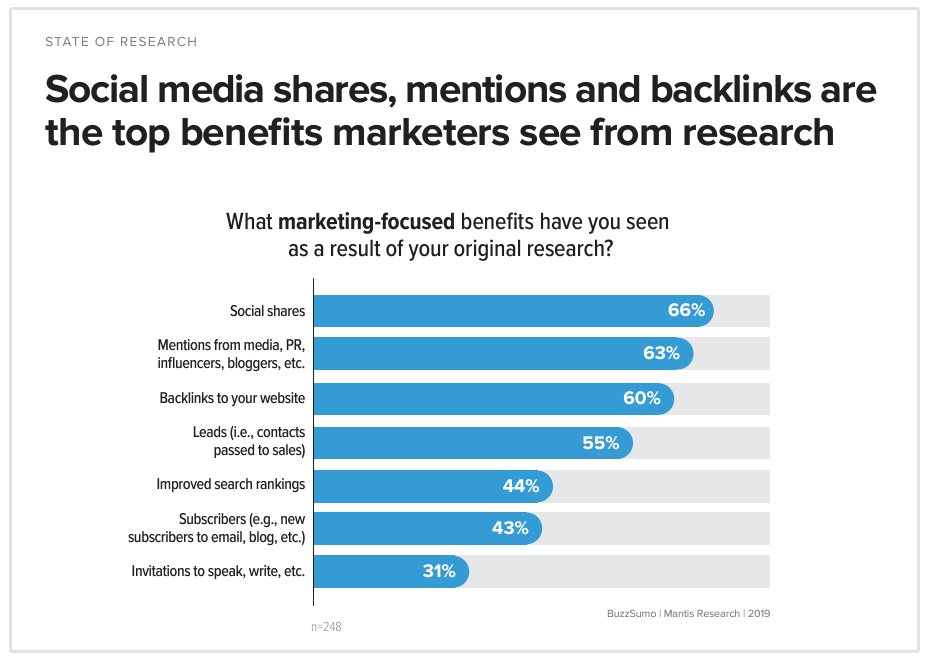
And the evidence is there, just take a look at HubSpot’s yearly “State of Marketing” report that includes key figures and findings on current marketing trends. This page has got thousands of backlinks from prominent publishers such as Search Engine Journal, Forbes, Neil Patel, and many others.

Hoosuite’s “Social Media Trends” report is another example of an industry report with more than 5,000 organic earned links from popular publishers and other internet companies.
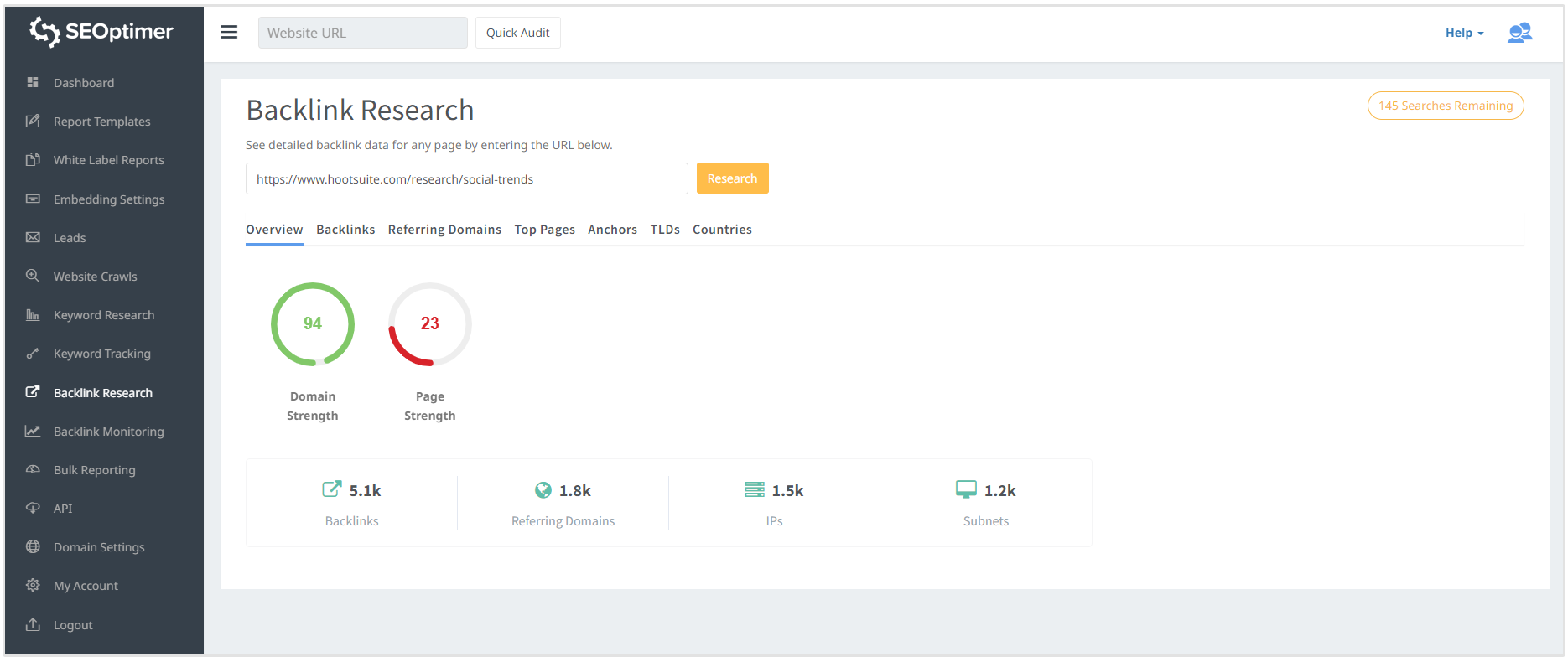
So yes, one of the best ways to get earned links is by creating these types of industry reports. The thing is that these types of reports take a lot of time to create, especially if you want to provide really insightful findings.
Creating one of these reports isn’t as easy as writing a blog article.
However, if you manage to publish one of these once every six months to a year, you’ll be well on your way to getting some more earned links to your website.
3. Add Linkable Assets to Blog Posts
Linkable assets are great backlink generators. These include downloadable ebooks, templates, guides, or infographics.
For instance, here’s a great infographic from WordStream on the topic of keyword placement for on-page SEO:
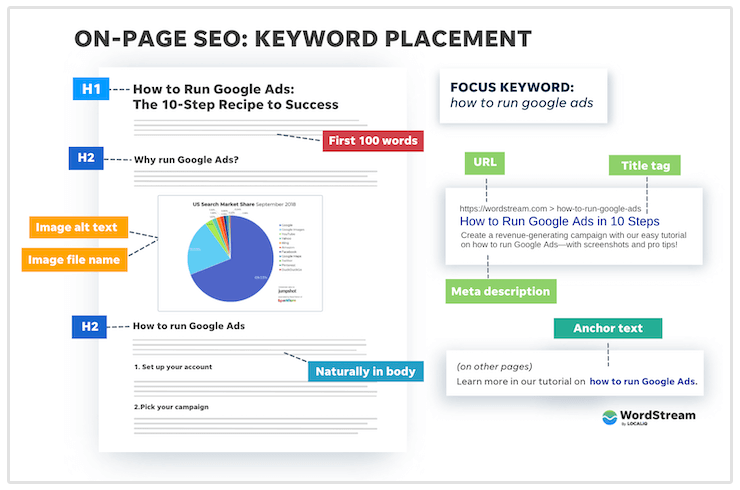
The infographic gives readers a clear idea on where to place target keywords on pages and blog posts.
Anyone writing about keyword placement or on-page SEO will likely want to include this infographic in their content, and therefore, link back to WordStream as a source.
Free online tools are also great for getting earned links. This includes mortgage calculators, budget planners, domain name generators, etc.
Without a doubt, the best way to get earned links is to build a free tool.
- Jared Tangir, Elevated Audience
These tools can function as standalone pages on your website, an example of this is Dave Ramsey’s Mortgage Calculator.
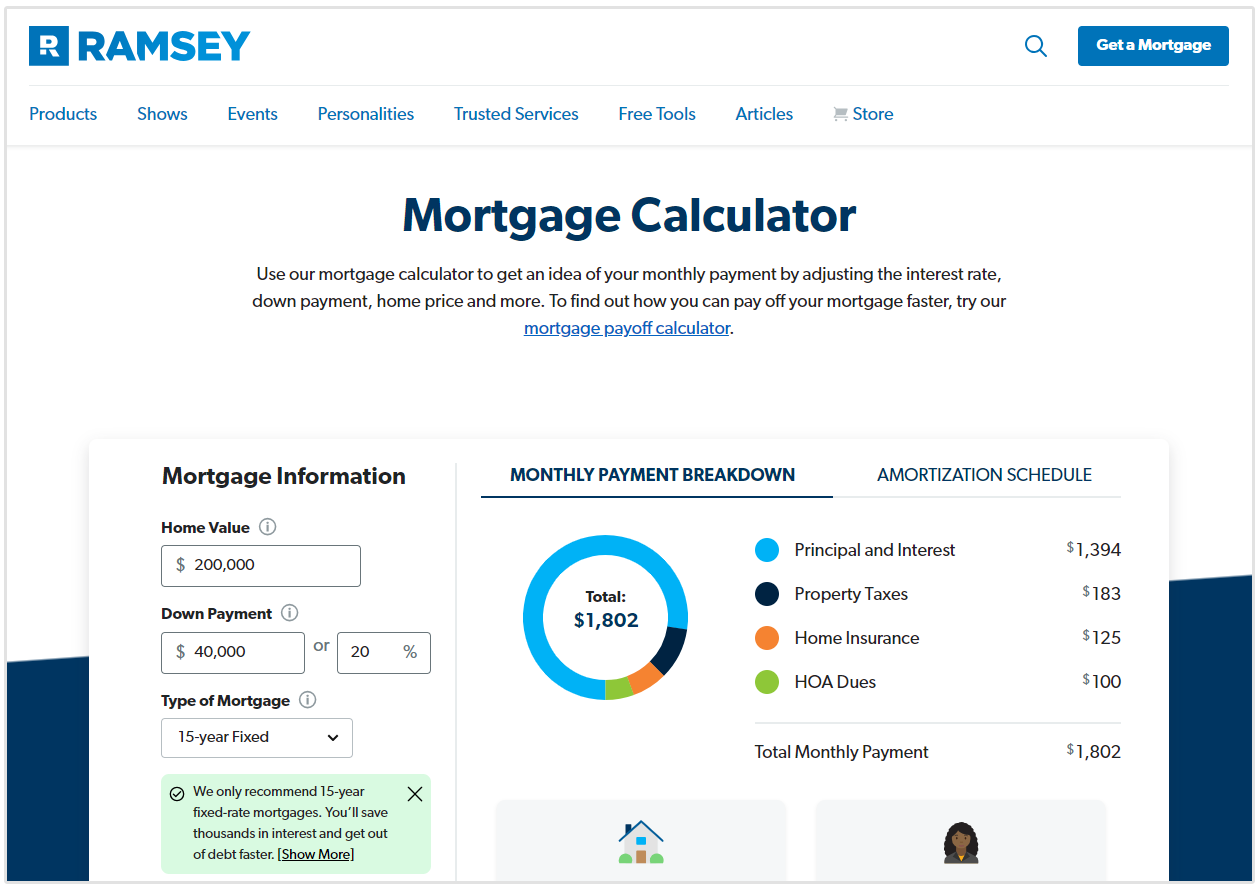
Or you can embed them in relevant blog posts. This tends to be better if you want to drive more earned links to specific blog posts.
Hubspot does this really well, instead of just creating a separate URL where visitors can download eBooks or templates, they also add linkable assets to blog posts.
Here’s an example of one of their blog articles that also includes Excel templates for SEO. As you can see, they’ve added a CTA to download the templates in the blog body itself, as well as in the sticky sidebar on the right.
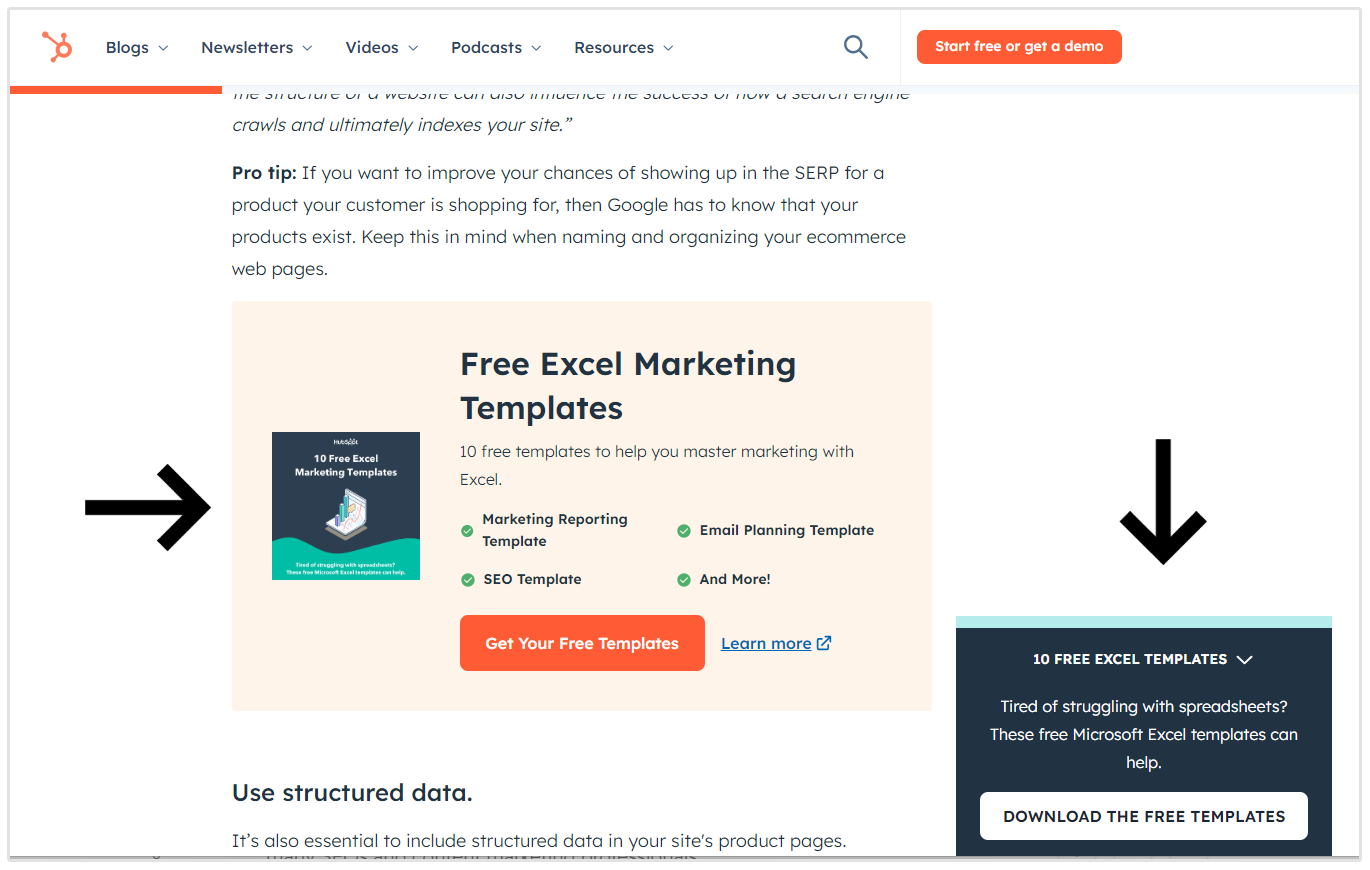
By including linkable assets in blog posts, you give others even more reasons to link back to you.
4. Put Quality over Quantity
With the advent of generative AI tools such as ChatGPT and Google Gemini, producing blog posts within hours has never been easier.
However, if you're aiming to earn valuable links and genuinely engage your audience, it's crucial to remember: quality trumps quantity every time.
One well thought out piece of content can sometimes be more valuable than 20 blogs with no thought or plan behind them.
- Lauren Richardson, Marketing Signals
Search engines love quality. Google's algorithms are designed to reward content that provides genuine value to users.
By focusing on quality, your content stands a better chance of achieving higher rankings, which translates to more visibility and more opportunities to earn links.
5. Promote Content in Other Places
Once you've invested time and creativity into crafting original, unique articles, the next important step is ensuring they reach as wide an audience as possible.
This can be done through sharing newly created posts on your social media profiles and in your weekly or monthly email newsletters.
At SEOptimer, we use a platform called Quuu Promote to gain social shares of all of our blog articles. We simply add the URLs of newly published articles, and then Quuu distributes these URLs via their content syndication network.

Lastly, although the idea is to organically earn links from other websites, you can still perform manual link-building to get some initial links to newly created content. This will help in improving SEO rankings and visibility, which will lead to more earned links.
By focusing on these key elements, you're not just crafting content; you're laying the foundation for an SEO strategy powered by earned links – the most authentic and enduring sign of your online relevance and influence.
How to Track Earned Links
Earning valuable backlinks takes effort, so it's important to understand how your link-building strategies are performing. Regularly tracking the backlinks pointing to your site can help you optimize your SEO efforts, spot trends, and identify potential issues.
One simple way to track your link profile is with our backlink monitoring tool.
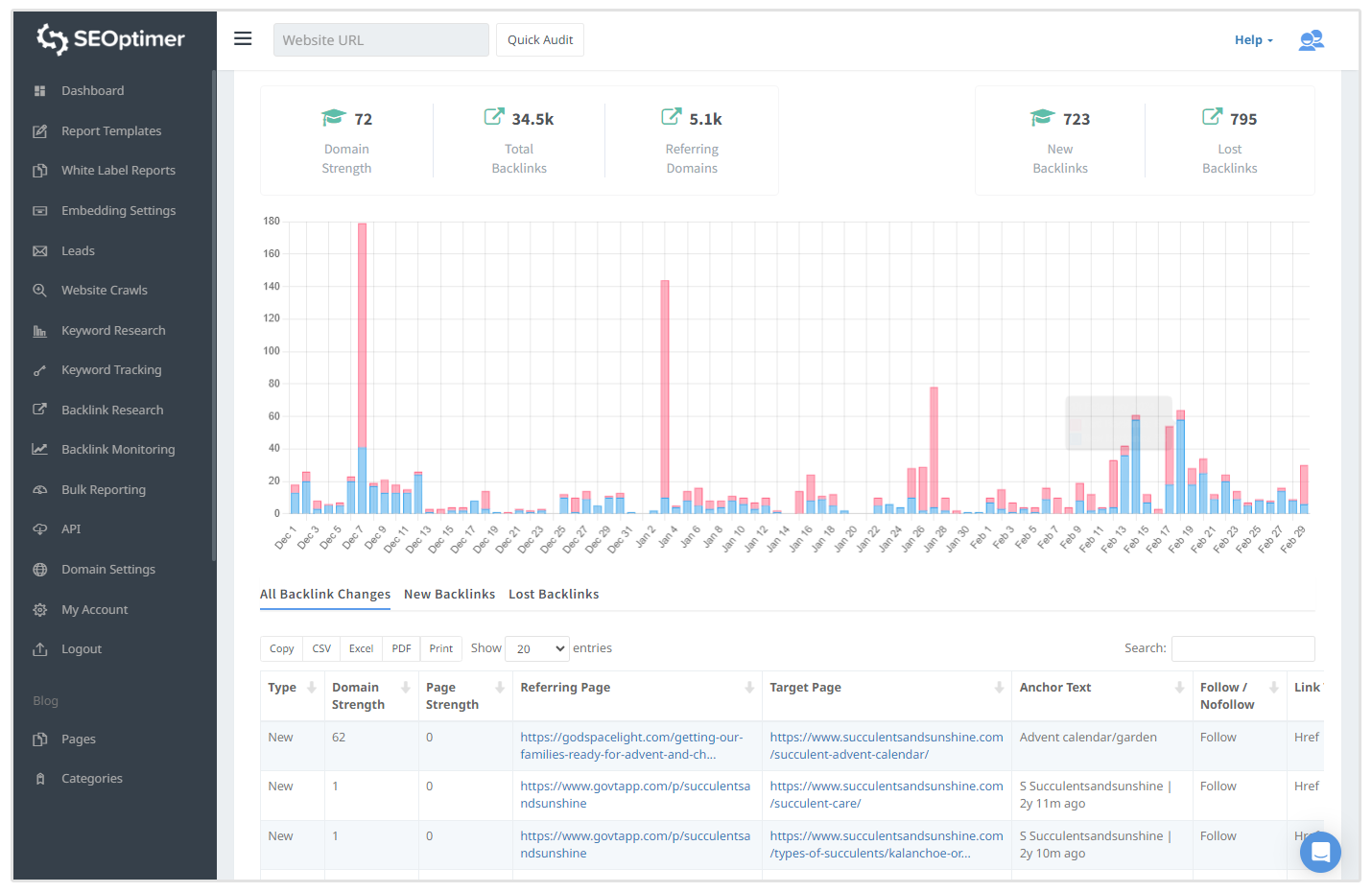
SEOptimer's Backlink Monitoring feature provides several benefits to users:
- New and lost link alerts: Get notified of new links you've earned and be alerted if any links are removed.
- Link quality data: Quickly assess the quality of your links, including their SEO strength, link type, and follow status.
- Negative SEO protection: Monitor for suspicious, potentially harmful backlinks and disavow them as needed.
- Weekly updates: Receive convenient email summaries on a weekly basis detailing changes to your backlink profile.
Earned Links FAQs
What kind of content attracts earned links?
Not all content is created equal when it comes to attracting earned links. While various factors can influence whether someone links to your content, specific types of content tend to generate more backlinks than others.
- Original research and data: Studies show content with unique data receives more backlinks.
- In-depth guides: Long-form content exceeding 3,000 words can acquire 77% more backlinks. (Source: Backlinko)
- Visual content: Infographics are shared 3x more than other content types on social media, increasing their link potential. (Source: Infographic World)
- Listicles and curated content: Well-organized lists can be valuable and attract links from similar content curators.
- Industry trends and thought leadership: Content establishing you as a thought leader attracts links from those seeking industry insights.
How long does it take to get earned links?
Earning links takes time and effort. While some links may appear quickly, it typically takes 3-12 months to see noticeable results from consistent link-building efforts. The timeframe can vary depending on factors like competition, website age, and link-building strategy.
How do I measure the quality of earned links?
Evaluating earned links involves assessing various factors. Our free Backlink Checker tool can help you analyze these metrics:
- Page Strength and Domain Strength: These metrics indicate the overall authority and influence of the website linking to you.
- Anchor Text: The text used in the link itself can provide clues about the context and relevance of the link.
- Follow vs. Nofollow: "Follow" links pass on SEO value, while "nofollow" links do not
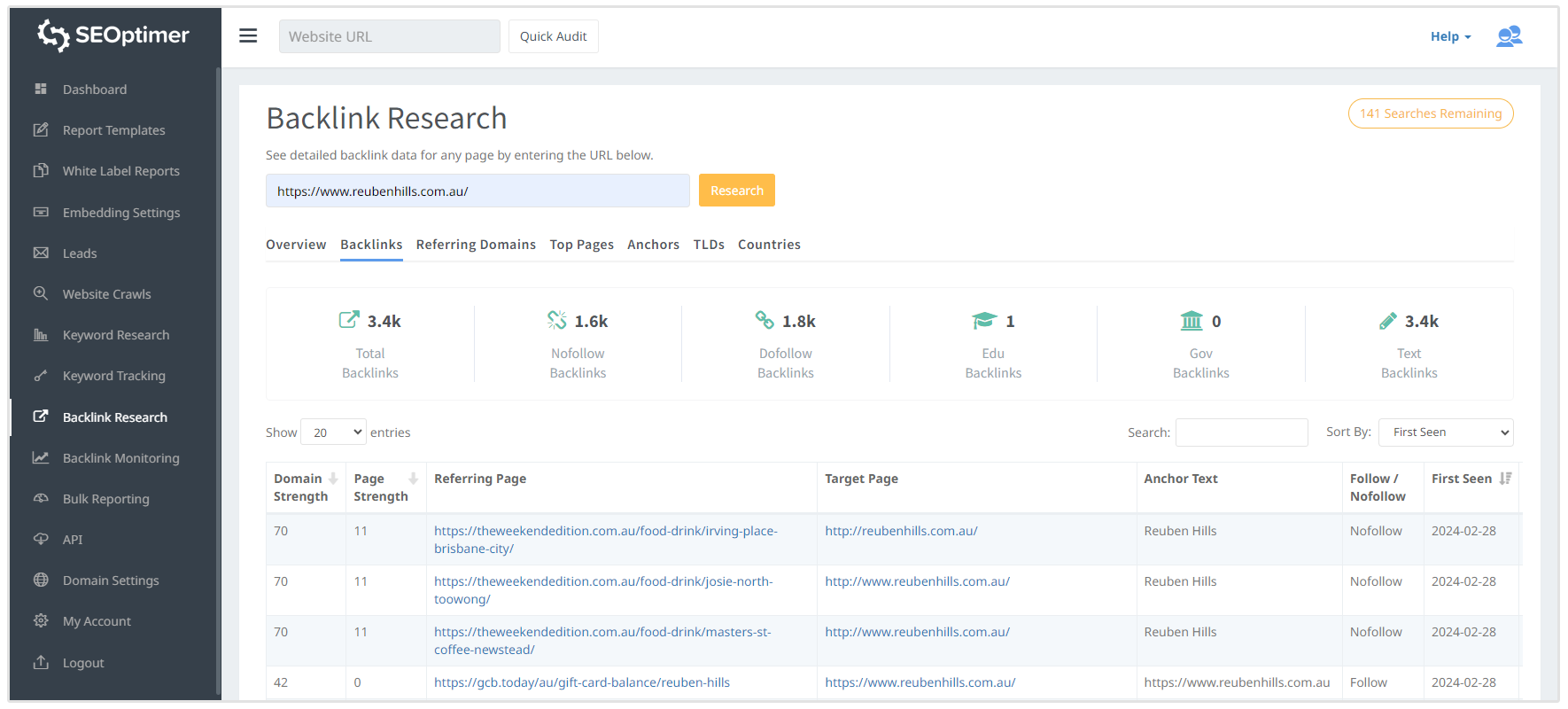
Conclusion
Cultivating a successful earned link strategy requires a commitment to creating valuable and engaging content.
By prioritizing your audience's needs, focusing on originality, and delivering exceptional quality, you position your website as a trusted resource and a natural magnet for backlinks. Remember, consistent effort in crafting exceptional content is the key to establishing your online authority, earning valuable backlinks, and ultimately achieving your marketing goals.
Did we leave out anything? What tips do you have on getting more earned links? Tweet to us @seoptimer.










